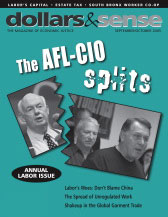Labor's Dubious Distinction Awards
This article is from the September/October 2005 issue of Dollars and Sense: The Magazine of Economic Justice available at http://www.dollarsandsense.org

This article is from the September/October 2005 issue of Dollars & Sense magazine.
Subscribe Now
at a discount.
Most Self-Centered Incumbent: Why did John Sweeney, 71 years old and a 45-year veteran of the labor movement, insist on a fourth term as AFL-CIO president? Though generally credited with good intentions and worthy goals, he excites little enthusiasm even from his own lieutenants. As a public speaker, he is ponderous; as a leader, deliberate to a fault. So, after serious setbacks on both the organizing and political fronts, why press on against a buzz-saw of internal opposition? "I think Andy Stern's insults brought out the Irish in him," was how one of Sweeney's own top brass explained it to me.
Most Self-Centered Dissident: SEIU President Andrew Stern offered the thinnest of rationales for taking a wrecking ball to the AFL-CIO. Whereas once John L. Lewis built a new labor federation, the CIO, on the three substantial legs of industrial (vs. craft) unionism, support for sit-down strikes, and a close alliance with Roosevelt's New Deal, Stern, the thinking-person's side of the Stern-Hoffa alliance, offers only bureaucratic proposals to consolidate unions and better coordinate organizing. Since by walking out, CTW has left the labor movement both less consolidated and less coordinated, what good has he accomplished?
Best Speaker with the Best Line: Martin Ludlow, the son of an A.M.E. preacher who recently replaced the much-loved Miguel Contreras as head of the Los Angeles County Federation of Labor, began his remarks by promising to follow "the three Bs" of convention rhetoric--"Be Brief, Brother." Together, Ludlow and Cindy Chavez, the vice mayor of San Jose, provided ample evidence that southern California is truly the epicenter of the labor movement of the future.
Most Extreme Loss of Perspective: AFL-CIO Executive Vice-President Linda Chavez-Thompson listed the top five forces "trying to stop the workers' movement"--the Chamber of Commerce, the National Association of Manufacturers, the National Right-To-Work Committee, George W. Bush, and … the Change To Win coalition?
Best Blue-Collar Imitation On Stage: Feisty and fiery United Steel Workers President Leo Girard was one of several AFL-CIO loyalists to lambaste the dissidents who absented themselves from the convention. Before doing so, however, Girard informed the audience that federation executives had counseled him to "keep it clean." "I told them to kiss my ass," he said.
Best Losing Idea: With the withdrawal of SEIU and the Teamsters, chiefs from several smaller unions pressed to expand the size of the AFL-CIO Executive Council on the grounds that after showing their loyalty to the federation, each of the 55 remaining unions should hold at least one seat on the council. Explained International Longshore and Warehouse Union delegate Joe Wenzl, "It's not the size of the dog in the fight, it's the size of the fight in the dog!" Instead, the federation pushed through a resolution to reduce the size of the Executive Council from 51 to 43 vice-presidential seats (plus eight "open" seats to be held for "future bargaining").
Most Ominous Sign of Things To Come: The AFL-CIO's new war policy on state federations and central labor councils--that no one from a disaffiliated union can participate in either forum--will make things very hard for community-based labor and political coalitions to function. The question remains whether local leaders will abide by the tough talk or figure a way around it. As the president of the Federation of Puerto Rican Workers (himself an SEIU member) told me, "They say we can't work together, but [Puerto Rico]'s not even their country."
Biggest Missed Opportunity: On Monday July 25, the first day of the convention, the Association of Flight Attendants declared Thursday a "day of chaos" for United Airlines at O'Hare Airport, due to UAL's abominable raids on workers' pension funds. Though the AFL-CIO Executive Council paid lip service to the struggles of the airline workers, they missed a golden opportunity to reshape the public's view of the convention and of the national leadership. What if Sweeney had gotten himself arrested at the airport on Monday for sitting in to defend workers' pensions? Would Stern and Hoffa have been willing to abandon an AFL-CIO chief behind bars? The mood among delegates, and rank and file around the nation, I suspect, would not have allowed it.
A Hero's Biggest No-Show: As things came unglued at the convention, no one stepped forward to push the contentious parties to reconcile their differences for the good of all. Indeed, it is apparent that no one currently has the moral stature to unify U.S. labor or the left. In an earlier time, the task might have fallen to Martin Luther King, Cesar Chavez, or Jesse Jackson. In Mexico, the Zapatistas, as led by Subcomandante Marcos, exercise a moral claim on democratic-left opinion well beyond their own organizational strength. Who in the United States will play that role?
Biggest Mirage: Arriving at Chicago's Navy Pier on the last day of the convention, I saw three giant buses disgorging masses of delegates in purple t-shirts. Was this the SEIU, come to break bread again with their ex-brothers and sisters in the AFL-CIO? No, it was a gathering of the Apostolic Church of God. After all, what country did I think I was living in?
